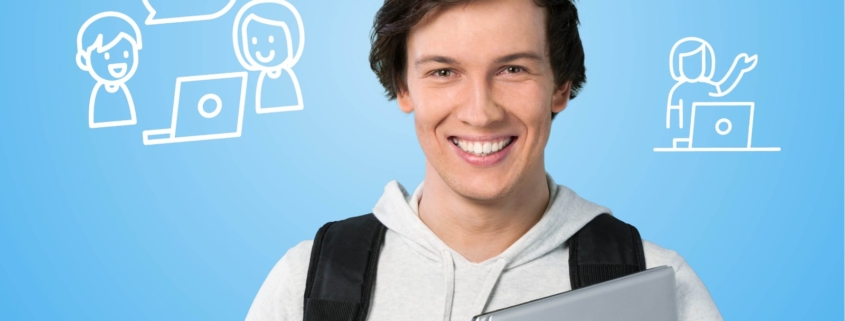Transformative education with presentation-based learning
When our students present a lesson, they actively engage in learning and grow their research, organisational, and speaking skills.The School Beyond Limitation approach of following the interests of our students and guiding them to teach others about this through reflection and presentation, fosters a sense of purpose in our young people, it pushes them to think critically, and prepares them for modern careers that prize skills like collaboration, problem-solving, and creativity. All teachers know that learning never ends and we are acutely aware that sometimes our best teachers are right there in our zoom rooms. We all know, too, that one of the best demonstrations of the mastery of a specific skill is to present that skill to someone else.
My first experience with a ‘presentation’ approach was at University – my English professor assigned a collaborative task to myself and two other students, then told us that we would ‘teach’ the entire lecture group what we had discovered. We were given the flexibility to choose our subject and we presented this to our peers, teaching them a lesson we had researched and prepared. To this day, I vividly remember this experience: It was a potent learning experience that has left an indelible imprint on me to this day.
At SBL, we believe that one of the most successful strategies we employ is to ask our students to lead the lesson and to present their learning to us. Student presentations are always student led and as a result are always student centred – meaning that there is often deep engagement in the topic and inspiration in the subject matter grows exponentially. Our aim in employing this with our students is for them to not only collaborate, or to engage deeply in an area of research but also for them to have an opportunity that will remain a memorable experience for them in years to come.
Our facilitators at SBL all have slightly different ways of approaching this, but usually it is a fairly simple and straightforward process. Groups or individual students research an area of interest, create a presentation, and then present a carefully constructed lesson to the entire class, including their facilitator. Students become the teachers and, therefore, the experts in their area of interest. Our students generally have the freedom to choose whichever topic inspires them, this not only motivates those doing the presenting – often their areas of interest create a further area of inspiration amongst those students that are being ‘taught’, this then evolves into deeper discussion and learning and prompts deeper inquiry. Our students also create assessments and quizzes that they present to their groups, they field a variety of questions testing their knowledge on their selected topic and often assign ‘action steps’ to their peers. Finally, each of our students then completes a self-reflection on their learning experience. This is an opportune time to reveal the inner workings of the group dynamic, what worked or didn’t work, who did all the work, and to share further learning.
Above all, SBL student presentations not only teach students essential skills like research, reading comprehension, oral presentation, and reflection but they also provide our students with a sense of ownership over their own learning and they greatly encourage their collective curiosity.
For our facilitators, there is indeed a palpable charge, almost a teacher’s ‘pride’ in seeing our students presenting to our other students, seeing our students become learned teachers to others.
Through this approach we not only instil a lifelong love of learning in our students, we also instil a love of teaching within them as well – a skill that will be a necessity throughout their adult lives. SBL student presentations provide our students with a product that reflects a culmination of deep learning and investigation, it allows and encourages them to interweave several important skills into one shared, dynamic, inspirational display of lifelong learning.
Perhaps even more important for our students though is that which goes beyond the topic specific knowledge they acquire through this approach. Presenting to their peers teaches our students tangible real-world skills such as collaboration, problem-solving, conflict resolution, communication and research skills that will travel with our students well into their future careers and lives – this is after all, what learning should be.
If you think that this would be the right school environment for your daughter/son then please reach out to us. Best wishes, Derek Suttie




Leave a Reply
Want to join the discussion?Feel free to contribute!